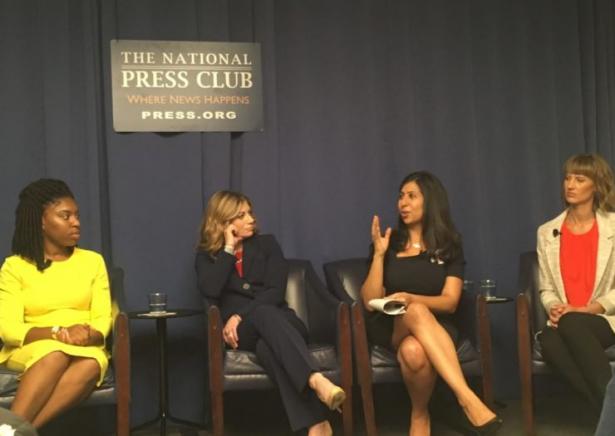Rachel Crooks was 22 and working as a receptionist in 2005 when she says Donald Trump forcibly kissed her. Today, her campaign to represent Ohio’s House District 88 aligns her with a group of women candidates who have gained momentum amid the #MeToo movement.
Crooks is now running to flip the District 88 seat from Republican to Democrat in the GOP-held Ohio state legislature.
“That was shocking and repulsive, and I held that in for many years thinking I was somehow to blame,” Crooks said of her alleged encounter with Trump. She spoke at a Tuesday panel featuring progressive candidates endorsed by People for the American Way’s Next Up Victory Fund at the National Press Club in Washington, D.C.
“In terms of the #MeToo movement, when I saw that was unfolding and that there were big men, powerful men, suffering consequences, but yet we still shielded President Trump from any consequences or from being held accountable, that really made me angry, infuriated,” she said. “And I just thought: We have to keep calling attention to this. We have a sexual predator in office, and that’s not OK.”
“This last year we saw an undeniable shift in how we tolerate sexual harassment and how we talk about it,” said Anna Eskamani, the Democratic candidate for the Florida State House’s District 47. Describing her experiences with a male supervisor who made repeated unwanted advances and her time in an abusive relationship, Eskamani explained that she came “to understand how my personal experiences had huge political implications—that the personal is political in that way.”
“These lived experiences fueled my decision to run for office and serve as my own moral compass,” she said. “The 2016 election inspired me to run for office, but it was the Women’s March in 2017 that further solidified my aspirations to do this work, and it was the #MeToo movement that reminded me that it’s so important that we not only run but that we win.”
“In a society of double standards, the exploitation of women and other marginalized communities is still too common,” Eskamani said. “Nothing will change unless abusive behavior towards marginalized people is no longer tolerated. And not just women of celebrity status, but also our housekeepers, farmworkers, and wait staff who live life every day in an environment of abuse and control without somebody to ask for help, especially if you’re undocumented.”
Katie Muth, a Democrat running to represent District 44 in the Pennsylvania State Senate, said it wasn’t the election that motivated her to run for office—she had decided to do so prior to Trump’s victory. But as a survivor of rape, she believes it’s “incredibly important to tell your story.”
Speaking of how #MeToo has changed the political climate in her state, Muth said the movement’s effect has gone beyond awareness. “The #MeToo movement speaks to bravery and women speaking their story, but it also speaks to the fact that women are not believed and are not respected, and that that hasn’t changed.” She said the issues highlighted by the movement are “intertwined with other things—whether its abuse of power accountability for people who do these things.”
Myya Jones, a 23-year-old Democratic candidate for Michigan State House District 4, said her experiences connecting her to the #MeToo movement began as a child and motivated her to become an activist. A recent graduate of Michigan State University, Jones was involved in campus activism, where, she said, “a lot of my work stemmed from me speaking out about issues and using my platform to really bring home things that are ignored, specifically when Black or brown people talk about issues that aren’t acknowledged, but then when somebody who is white talks about it, people want to pay attention to it.”
She explained that a big issue for her campaign is “showing people that Black women are viable candidates. We are the largest voting pool in the Democratic Party, and people look to us for votes but not for leadership.”
As a Black woman, Jones said she “face sexism and racism at the same time.” When asked about what advice she would give other young women about running for office, she said the U.S. political system is stacked against candidates like herself.
“You have to really fight the system,” said Jones. “Because don’t ever underestimate a system that wasn’t built for you. It wasn’t built for us and it still is not for us today. And we also have to be willing to keep telling our stories because when we have a seat at the table, we can bring stories of our communities to the forefront.”
Ally Boguhn is the news and political editor at Rewire.News. Prior to joining the team, she worked as an associate research director at Media Matters for America, where she specialized in analyzing media representations of reproductive rights and health.
Rewire.News is a nonprofit daily online publication. We seek to foster public knowledge and enlightenment through high-quality evidence-based news, analysis, commentary, and investigative reporting on issues of sexual and reproductive health, rights, and justice. Our staff is comprised of professional editors and journalists, as well as multimedia, social media, communications, development, technology and business managers.
We believe journalism has an inherent role in promoting a healthy and just society. We therefore take seriously our responsibility to seek truth and report it; minimize harm to people and communities through accurate reporting; act independently; offer vigorous commentary, debate, and opinion based on fact and considered thinking; and be accountable and transparent to our readers.
Subscribe to Rewire here.
Support Rewire.News
We're a small non-profit, but we serve millions of readers. Support quality journalism to hold Trump accountable. Chip in whatever you can afford to Rewire.News today.


Spread the word